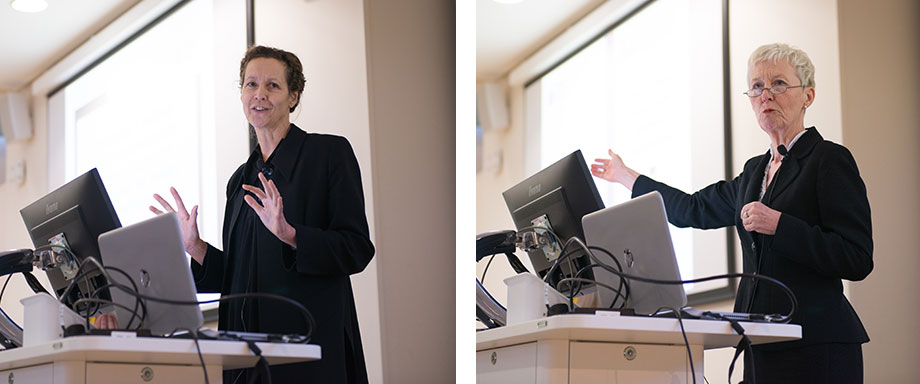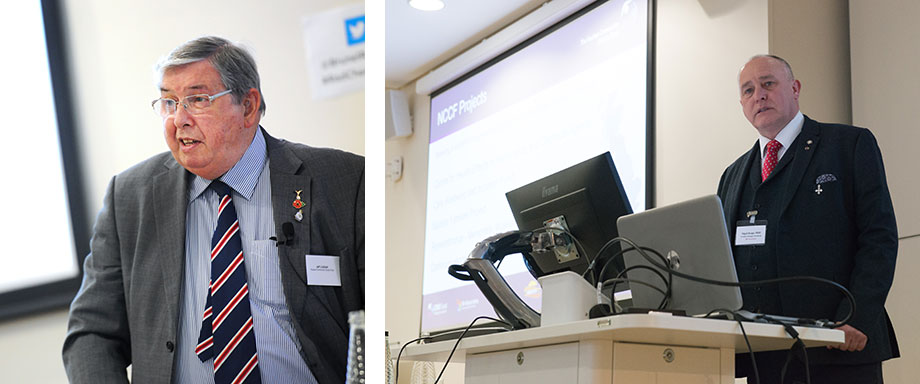British military veterans who were present at nuclear test sites in the 1950s and 60s, together with their families and researchers from several institutions, welcomed the launch of the Centre for Health Effects of Radiological and Chemical Agents (CHRC) at Brunel University London: a multi-disciplinary research initiative designed to benefit the entire nuclear community.
The new centre is in partnership with the Nuclear Community Charity Fund, which was set up in 2016 by the British Nuclear Test Veterans Association (BNTVA) to fund projects benefiting the nuclear community by alleviating suffering and increasing wellbeing.
"What we are announcing today are a number of research projects addressing important biological, psychosocial, and health and wellbeing questions that will form the basis of evidence-based education and support," said CHRC's Director, Dr Rhona Anderson, at the launch event at Brunel's campus in Uxbridge.

Dr Rhona Anderson addressing the CHRC launch event
Studying veterans' blood
One of the long-standing questions is whether the nuclear tests have caused any lasting genetic changes for the veterans and for their descendants.
To provide answers, CHRC is recruiting family trios – father, mother and one of their children – from the nuclear community and from a control group of military veterans who were not present at nuclear test sites, but who served at the same time.
"This recruitment process is currently underway," said Dr Anderson, "and we ask all who receive our invitation – sent out through GPs – to consider participating, and donating a small amount of their blood for this important research."
Blood samples from 50 family trios from the test group and 50 from the control group will be rigorously studied using state-of-the-art cytogenetic and whole-genome sequence techniques. The results of the research, expected in 2020, will say whether the health of the test group of veterans has been adversely affected by their experiences.
Complementary projects
The launch event, attended by over 80 people, showcased other research projects that the new centre is running, including:
- understanding how living with 'exposure worry' affects the ability to age healthily (led by Professor Mary Gilhooly)
- how sport and cultural interventions can be used to enhance the nuclear community's health and wellbeing (led by Dr Louise Mansfield)
- analysing the combined effects of exposure to radiation and chemical mixtures (led by Professor Andreas Kortenkamp).
Dr Anderson remarked: "Our broad vision is that our work will lead to a much more joined-up approach to understanding health needs that will lead to better guidance for healthcare professionals and, in turn, lead to better guidance and support for families."

Dr Louise Mansfield and Professor Mary Gilhooly
Community support
Nuclear test veteran Jeff Liddiatt spoke about witnessing nuclear tests in 1959 in Maralinga, Australia, and the poor health he has experienced since then. Commenting afterwards, he heralded CHRC's launch: "This brings together all the things we've talked about for so many years.
"We have every confidence that this will go forward and produce maybe not what we want it to produce, but produce something factual that people can work with."
Nigel Heaps MBE of BH Associates, who was involved in the campaign that led to the founding of the NCCF, presented an overview of the fund’s projects, and added: "This dream that many veterans had – including my father, who passed away a number of years ago – to see this come alive into something palpable, and something that'll benefit not just the veterans but contaminated communities around the world, is just phenomenal.
"It's a historic occasion, and who knows where this will lead ultimately."

Jeff Liddiatt and Nigel Heaps MBE
Fellow test veteran descendant Alan Owen, Chairman of the BNTVA, said: "The team have worked so hard to get to this stage, and the whole community is really looking forward to seeing the outcome of the research, and working together as a community."
CHRC is part of Brunel’s Institute of Environment, Health and Societies, whose practical research is helping millions of people worldwide lead healthier, happier lives.
“I’m thrilled to see this important new centre brought to life,” said Institute Director, Professor Susan Jobling. “Its activities are all great examples of different disciplines working together on significant, world-leading research projects.
“We’re proud to have this centre at Brunel, and even prouder of how it will provide lasting, long-term benefit to the nuclear test veteran community.”
For more about CHRC's projects, including the recruitment process for the genetic and cytogenetic study, visit chrc4veterans.uk.
CHRC's work involves collaboration with the London School of Hygiene & Tropical Medicine and the University of Leicester.
Reported by:
Joe Buchanunn,
Media Relations
+44 (0)1895 268821
joe.buchanunn@brunel.ac.uk